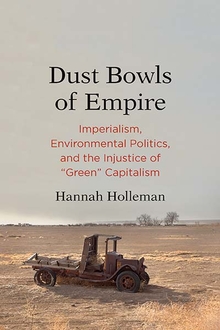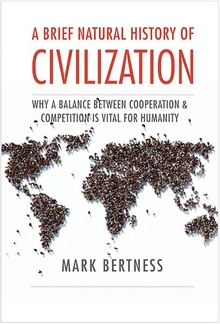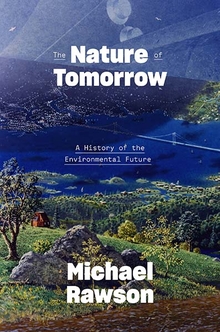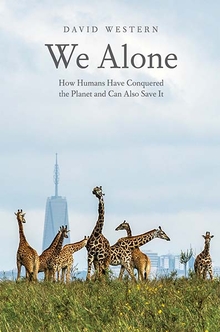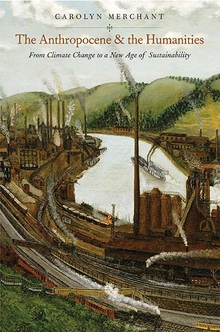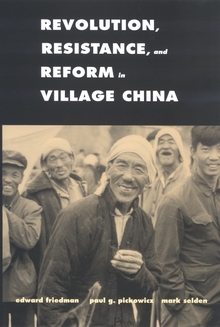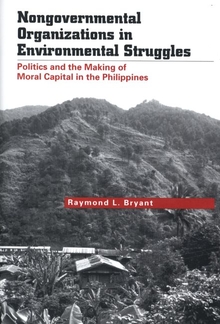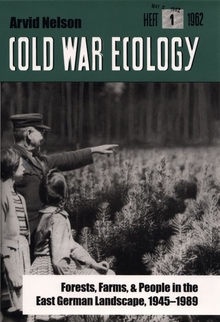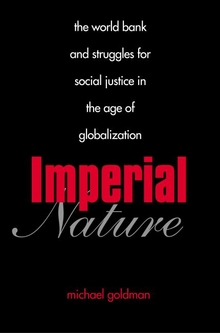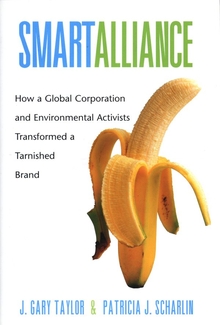Dust Bowls of Empire
WARNING
You are viewing an older version of the Yalebooks website. Please visit out new website with more updated information and a better user experience: https://www.yalebooks.com
Imperialism, Environmental Politics, and the Injustice of "Green" Capitalism
Hannah Holleman
A profound reinterpretation of the Dust Bowl on the U.S. southern plains and its relevance for today
The 1930s witnessed a harrowing social and ecological disaster, defined by the severe nexus of drought, erosion, and economic depression that ravaged the U.S. southern plains. Known as the Dust Bowl, this crisis has become a major referent of the climate change era, and has long served as a warning of the dire consequences of unchecked environmental despoliation.
Through innovative research and a fresh theoretical lens, Hannah Holleman reexamines the global socioecological and economic forces of settler colonialism and imperialism precipitating this disaster, explaining critical antecedents to the acceleration of ecological degradation in our time. Holleman draws lessons from this period that point a way forward for environmental politics as we confront the growing global crises of climate change, freshwater scarcity, extreme energy, and soil degradation.
The 1930s witnessed a harrowing social and ecological disaster, defined by the severe nexus of drought, erosion, and economic depression that ravaged the U.S. southern plains. Known as the Dust Bowl, this crisis has become a major referent of the climate change era, and has long served as a warning of the dire consequences of unchecked environmental despoliation.
Through innovative research and a fresh theoretical lens, Hannah Holleman reexamines the global socioecological and economic forces of settler colonialism and imperialism precipitating this disaster, explaining critical antecedents to the acceleration of ecological degradation in our time. Holleman draws lessons from this period that point a way forward for environmental politics as we confront the growing global crises of climate change, freshwater scarcity, extreme energy, and soil degradation.
Hannah Holleman is assistant professor of sociology at Amherst College, where she works in the areas of social theory, environmental sociology, environmental studies, political economy, and social movements.
“Hannah Holleman makes the links between the past and present so starkly clear that it is impossible not to share the book’s conclusions regarding the necessity of both significant social change and a completely new approach to global environmental policy and politics.”—Roxanne Dunbar-Ortiz, author of An Indigenous Peoples’ History of the United States
“In Dust Bowls of Empire, Hannah Holleman brilliantly examines the links between global social processes and regional ecological outcomes. The result is an original and thought-provoking analysis of an iconic event in U.S. environmental history.”—Stefano B. Longo, North Carolina State University
“In an age of climate change and an escalating global land rush, Hannah Holleman shows with superb clarity how social domination leads to eco-imperialism and environmental degradation, and why the route to saving the planet must lie through social justice.”—Fred Pearce, author of The Land Grabbers: The New Fight over Who Owns the Earth
“A rigorous analysis of the logics of capitalism, which generates the destruction of agrarian land. A capital-friendly green policy is therefore an oxymoron. ‘Green’ demands moving out of capitalism.”—Samir Amin, author of Modern Imperialism, Monopoly Finance Capital, and Marx's Law of Value
"A clear and insightful analysis of the role of capitalism and colonialism in causing the U.S. Dust Bowl of the 1930s and destroying farmland around the world today. Essential reading for ecology activists."—Ian Angus, author of Facing the Anthropocene: Fossil Capitalism and the Crisis of the Earth System
“Hannah Holleman masterfully develops the ecological, historical, economic, and political context of the U.S. Dust Bowl of the 1930s, demonstrated to result from land appropriation and use under the drive for profits.”—Fred Magdoff, University of Vermont
"The Dust Bowl continues to haunt, inspire, and teach us — but as this book shows, we have missed its most profound and far-reaching implications. Unearthing a wealth of new sources, and pulling together disparate analytical threads, Holleman tells a story of global ecological crisis — then and now — rooted in global systems of domination and extraction. A tour de force of engaged scholarship from an exhilarating new voice."—Naomi Klein, author of No Is Not Enough and This Changes Everything
“More than simply a work of critical historical reinterpretation, Dust Bowls of Empire is also a deep reflection on the ecological and social causes of twenty-first century dustbowlification, intensified this time around by anthropogenic climate change, but having its roots as before in empire and the robbery of both the soil and worker. Here is a new, strong, irrepressible voice in the Climate Revolution of our time.”—John Bellamy Foster, author of Marx’s Ecology
“This is a rare work of exceptional scholarship. Hannah Holleman argues compellingly that only when we grasp the enormous roles that colonialism, imperialism, and racism have played in producing our ecological crises—past and present—will we have any hope of addressing the challenges before us.”—David Naguib Pellow, UC Santa Barbara
“One of the most important books on environmental history and sociology of this century. It will shape research on the Dust Bowl, soil degradation, climate change, imperialism, and the movements for social and environmental justice for years to come”—Richard York, University of Oregon
“As we stand on the precipice of irreversible planetary ruin from climate change, Hannah Holleman’s Dust Bowls of Empire provides urgently needed insights about how ecological degradation is rooted in social domination and capitalist development.”—Shannon Elizabeth Bell, Virginia Tech, author of Fighting King Coal: The Challenges to Micromobilization in Central Appalachia
“One does not often come across a book that is so radical on its surface and so reasonable in its deeper arguments.”—M. C. Stephan, Choice
"Dust Bowls of Empire beautifully exemplifies the feminist commitment to apply scholarly knowledge and theory to serious questions of political practice and public policy."—Baligh Ben Taleb, Great Plains Quarterly
Listed on Choice's Outstanding Academic Titles List for 2019
ISBN: 9780300230208
Publication Date: November 20, 2018
Publication Date: November 20, 2018
256 pages, 5 1/2 x 8 1/4

